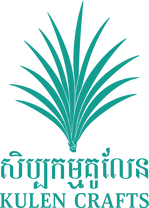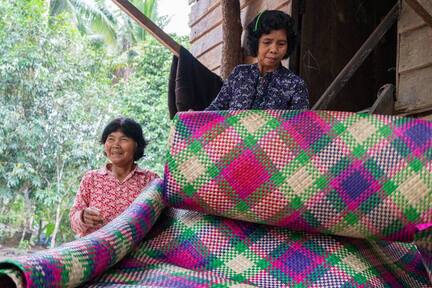Our Development work
The Development component of the Phnom Kulen Programme aims to strengthen civil society and reduce poverty by focusing on three themes:
-Hygiene and sanitation,
-Alternative livelihoods/income generation (agriculture and community-based tourism centres)
-Promotion of education and infrastructures.
With a fast-growing population of 4,700 over ten villages, Phnom Kulen is facing increasing environmental, demographic or socio-economic challenges. Most of the villagers are subsistence farmers growing rain-fed upland rice in rotation with cassava, sweet potatoes, and other crops. They practice ‘slash and burn’ agriculture, clearing and burning plots of land, farming for one year then abandoning it to the forest. Since 2000, many plots used for rice production have been converted by villagers to permanent plantations of cashew nut trees, forcing themselves to clear new patches of forest for agriculture.
The goal of the development component is to revert this trend by convincing the population to give up damaging agricultural practices for sustainable income-generating activities. Participating to archaeological work to earn money is another way for them to adopt a more sustainable way of life.
Our Tree Nurseries in 3 primary schools also acts as educational tools to built environmental awareness for the young generation and to protect the Phnom Kulen natural environment.
-Hygiene and sanitation,
-Alternative livelihoods/income generation (agriculture and community-based tourism centres)
-Promotion of education and infrastructures.
With a fast-growing population of 4,700 over ten villages, Phnom Kulen is facing increasing environmental, demographic or socio-economic challenges. Most of the villagers are subsistence farmers growing rain-fed upland rice in rotation with cassava, sweet potatoes, and other crops. They practice ‘slash and burn’ agriculture, clearing and burning plots of land, farming for one year then abandoning it to the forest. Since 2000, many plots used for rice production have been converted by villagers to permanent plantations of cashew nut trees, forcing themselves to clear new patches of forest for agriculture.
The goal of the development component is to revert this trend by convincing the population to give up damaging agricultural practices for sustainable income-generating activities. Participating to archaeological work to earn money is another way for them to adopt a more sustainable way of life.
Our Tree Nurseries in 3 primary schools also acts as educational tools to built environmental awareness for the young generation and to protect the Phnom Kulen natural environment.
Hygiene and Sanitation
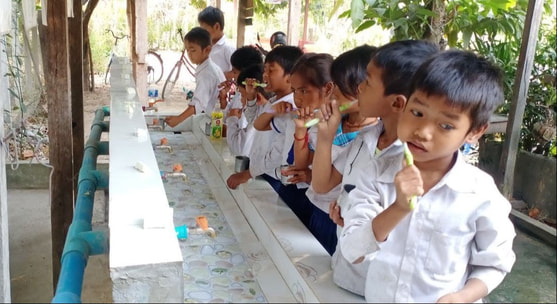
The ADF previously implemented a series of activities to ensure that local villagers, especially children, have the minimum intake of calories required for a healthy development. A nutrition and hygiene awareness program targeting more than 260 children under the age five in seven villages is monitoring the growth of these children and providing them with nutritional supplements if they happen to be under the norms established by the World Health Organization (WHO) and adopted by the Cambodian Ministry of Health.
The nutrition program was solely funded by the Australian Agency for International Development (AusAID), between 2011 and december 2013. It was then entirely funded (from April 2014 to June 2017) by a generous donor, focusing on 4 villages (Khlah Khmum, Sangke Lak, Phum Thmei and Popel) targeting the children under 5 years old and their mother. Extra attention is given to handicapped children and the ADF team is liaising with the Health Center in Anlong Thom village, to send the kids in the Siem Reap hospitals when it is necessary.
ADF has signed an agreement with the Karolinska Institute (Stockholm, Sweden) to implement an assessment and recommandations of its Nutrition and Hygiene program. It was done in May and June 2017, by two Master Degree students and constitute the base for the ADF management team to reorientate and improve this component.
As a result, ADF has reoriented in 2018 this complement into a sole Hygiene and Sanitation one, under the framework of the project entitled WISH, focusing on 2 primary schools (Sangke Lak and Khlah Khmum) since June 2018, and funded by Almayuda Fundacion. In January 2021, it was extended for two more years, benefiting 2 additional primary schools (Popel and Ta Penh). The regular soap donations from Naga Earth help us to maintain good hygiene standards in theses schools!
The nutrition program was solely funded by the Australian Agency for International Development (AusAID), between 2011 and december 2013. It was then entirely funded (from April 2014 to June 2017) by a generous donor, focusing on 4 villages (Khlah Khmum, Sangke Lak, Phum Thmei and Popel) targeting the children under 5 years old and their mother. Extra attention is given to handicapped children and the ADF team is liaising with the Health Center in Anlong Thom village, to send the kids in the Siem Reap hospitals when it is necessary.
ADF has signed an agreement with the Karolinska Institute (Stockholm, Sweden) to implement an assessment and recommandations of its Nutrition and Hygiene program. It was done in May and June 2017, by two Master Degree students and constitute the base for the ADF management team to reorientate and improve this component.
As a result, ADF has reoriented in 2018 this complement into a sole Hygiene and Sanitation one, under the framework of the project entitled WISH, focusing on 2 primary schools (Sangke Lak and Khlah Khmum) since June 2018, and funded by Almayuda Fundacion. In January 2021, it was extended for two more years, benefiting 2 additional primary schools (Popel and Ta Penh). The regular soap donations from Naga Earth help us to maintain good hygiene standards in theses schools!
Alternative livelihood and income-generating activities
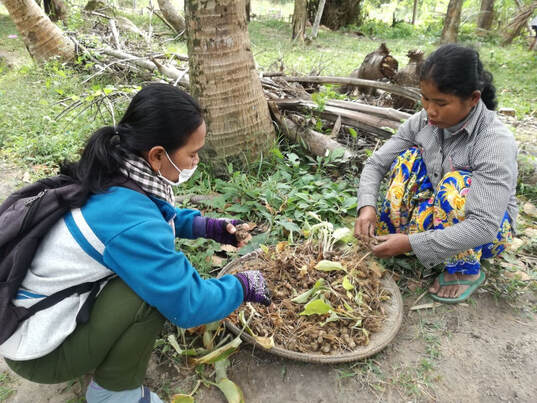
Agriculture
The ADF works with about 50 local farmers to reduce their impact on the forest of Phnom Kulen by progressively shifting their destructive agricultural habits to high yielding, environmentally-friendly practices: fish and chicken raising as well as seasonal vegetable growing. Since 2018, ADF is collaborating with the Banteay Srey Butterfly Center to find families willing to raise chrysalides. Another test pilot activity was set up in 2018: pig raising.
Enthusiastic families are provided with basic materials and training to start their activity in their own house, an activity saving them long travel to distant fields and compatible with a family life with children. Once farmers are financially and technically independent, ADF leaves them manage their micro-business.
In May 2019, ADF started a new partnership with AGRISUD International, a specialised I-NGO on agro-ecology. The objective is to bring alternative livelihoods to 150 families with native Phnom Kulen products that have a higher commercial value. Farmer groups and access to market will be developed to insure the sustainability of the project.
This component is supported by Terre Cambodge, other travel agencies (Chamaeleon-Stiftung travel agency, Allibert Trekking, and ECM Voyages) and previously the Almayuda Fundacion. There are some highlights of the activities for this component on Chamaeleon-Stiftung page and the Almayuda Fundacion website.
Moreover, to ensure that the community benefits directly from the presence of archaeological sites around their village, over 60 villagers are recruited as daily workers during the annual excavation campaigns. Additionally, 50 villagers are now working full time as guards and workers for the APSARA National Authority in the maintenance and protection of archaeological sites.
The ADF works with about 50 local farmers to reduce their impact on the forest of Phnom Kulen by progressively shifting their destructive agricultural habits to high yielding, environmentally-friendly practices: fish and chicken raising as well as seasonal vegetable growing. Since 2018, ADF is collaborating with the Banteay Srey Butterfly Center to find families willing to raise chrysalides. Another test pilot activity was set up in 2018: pig raising.
Enthusiastic families are provided with basic materials and training to start their activity in their own house, an activity saving them long travel to distant fields and compatible with a family life with children. Once farmers are financially and technically independent, ADF leaves them manage their micro-business.
In May 2019, ADF started a new partnership with AGRISUD International, a specialised I-NGO on agro-ecology. The objective is to bring alternative livelihoods to 150 families with native Phnom Kulen products that have a higher commercial value. Farmer groups and access to market will be developed to insure the sustainability of the project.
This component is supported by Terre Cambodge, other travel agencies (Chamaeleon-Stiftung travel agency, Allibert Trekking, and ECM Voyages) and previously the Almayuda Fundacion. There are some highlights of the activities for this component on Chamaeleon-Stiftung page and the Almayuda Fundacion website.
Moreover, to ensure that the community benefits directly from the presence of archaeological sites around their village, over 60 villagers are recruited as daily workers during the annual excavation campaigns. Additionally, 50 villagers are now working full time as guards and workers for the APSARA National Authority in the maintenance and protection of archaeological sites.
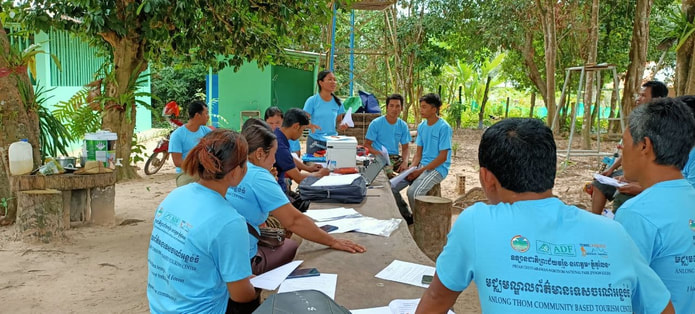
Community-based Tourism Centres in Popel and Anlong Thom villages
Prior to 2017, there was very little tourism in Phnom Kulen plateau, apart from the very visited area of Preah Ang Thom. This area has attracted Cambodians from every provinces to settle and provide services such as shops and restaurants. Locals farmers from Phnom Kulen were pushed away as they had no skills for this industry.
In 2017, a major road construction was started to reach the other villages and Svay Leu district town, to the east of Phnom Kulen and north of Beng Mealea temple.
Anticipating the future tourism flow, ADF and Terre Cambodge set up two Commune-Based Tourism Centres (CBTC) in Anlong Thom and Popel villages. Their objective is to provide additional incomes to the villagers of the forest community (CPA). They were respectively funded by ECM and TDS french travel agencies (Anlong Thom CBTC) and UNDP and HUMY (Popel CBTC, see our sponsors).
The centres provide a tourism offer and present general information about Phnom Kulen and local handicraft products. They offer one day treks toured by a local guide in the beautiful natural areas and historic sites of the park, providing locally purchased food, wrapped in eco-friendly and perishable materials. Each CBTC team is part of the corresponding Community Protected Area of Anlong Thom and Popel.
Please contact Popel and Anlong Thom CBTC's to get further information on the half day and full day tours. You can also check the videos presenting the Popel and Anlong Thom CBTCs' on this page.
We are looking forward to see you up upthere!
Prior to 2017, there was very little tourism in Phnom Kulen plateau, apart from the very visited area of Preah Ang Thom. This area has attracted Cambodians from every provinces to settle and provide services such as shops and restaurants. Locals farmers from Phnom Kulen were pushed away as they had no skills for this industry.
In 2017, a major road construction was started to reach the other villages and Svay Leu district town, to the east of Phnom Kulen and north of Beng Mealea temple.
Anticipating the future tourism flow, ADF and Terre Cambodge set up two Commune-Based Tourism Centres (CBTC) in Anlong Thom and Popel villages. Their objective is to provide additional incomes to the villagers of the forest community (CPA). They were respectively funded by ECM and TDS french travel agencies (Anlong Thom CBTC) and UNDP and HUMY (Popel CBTC, see our sponsors).
The centres provide a tourism offer and present general information about Phnom Kulen and local handicraft products. They offer one day treks toured by a local guide in the beautiful natural areas and historic sites of the park, providing locally purchased food, wrapped in eco-friendly and perishable materials. Each CBTC team is part of the corresponding Community Protected Area of Anlong Thom and Popel.
Please contact Popel and Anlong Thom CBTC's to get further information on the half day and full day tours. You can also check the videos presenting the Popel and Anlong Thom CBTCs' on this page.
We are looking forward to see you up upthere!
|
Handicrafts support : "Kulen Crafts"
Today, the Kulen plateau is populated by more than 4900 inhabitants, distributed in ten villages. Most of the villagers are subsistence farmers. Some of the eldest villagers also create artisanal handmade items: mats, baskets, brooms, fishing traps made of rattan, bamboo as well as blacksmith knives and cutting tools. This tradition is quickly fading if it is not transmitted to the younger generation and supported by a larger market. In the framework of the ADF-Archaeology & Development Foundation’s alternative livelihood component for the Phnom Kulen villagers, these environmentally friendly and local handicrafts products have been identified as a source of income. Thanks to HUMY's support, ADF is encouraging these vulnerable villagers by bringing these items to the market and organising training classes so the elders can share their knowledge to younger generations. Every product is unique, some are seasonally-made but all are the result of several weeks of work and passion. To promote and transmit this knowledge, ADF has set up "Kulen Crafts", a branded company supporting this social business. By purchasing these items, you are supporting directly the craftsmen and their ancestral traditions! They are available in Siem Reap and at the Anlong Thom and Popel Community-based Tourism Centers in Phnom Kulen. Please contact Kulen Crafts. |
Promotion of education
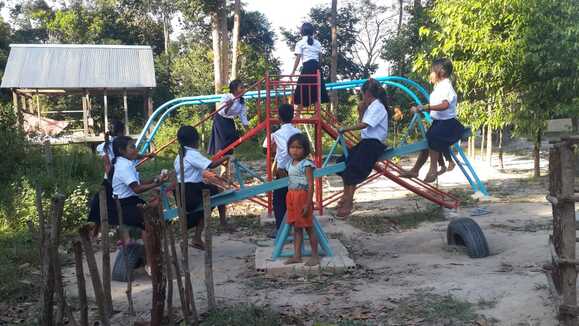
The ADF believes that education is paramount to break the circle of poverty on Kulen Mountain. With proper education, the children of subsistence farmers increase their chances of being employed instead of having to farm for a living. As a result, the population is empowered and has a chance to escape the poverty cycle.
To promote education and improve the primary school facilities, ADF finances the construction and rehabilitation of school buildings, toilets, incinerators, water system, and provide furniture, teaching materials, supplies, as well as playground equipment.
Tree nurseries were also constructed to act as educational tools, to built environmental awareness among the youngest generation. They provide trees to be planted regularly into deforested areas, under the control of the Ministry of Environment.
Donations have allowed ADF team to bring extra material support to the Anlong Thom and Ta Penh primary schools, including these tree nurseries. This component has been reinforced in 2016 and 2017 in Sangke Lak primary school thanks to the support of TDS travel agency and Terre Cambodge, under the framework of the KURERE project. From mid-2018, it has been developed and enhanced thanks to the Almayuda Fundacion support in this last school as well as in Phum Khlah Khmum school, within ou Hygiene component (see above Hygiene and Nutritional health).
Since 2019, thanks to the support of our new partner the South East Asia Foundation, ADF is supporting the construction of additional basic infrastructures in every primary schools of Khnong Phnom Commune. Work is done in close coordination with the principals and teachers of each schools, to ensure it corresponds to the teachers and students needs. The buildings and the corresponding furnitures are being constructed and delivered according to the regular assessments done together with SE Asia Foundation, ADF team and the principals.
Infrastructures
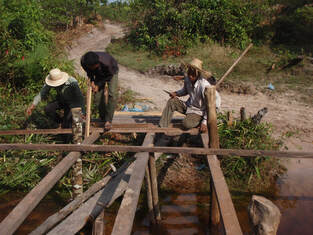
The road condition on Phnom Kulen is a serious obstacle to economic development. During the rainy season, all travel by car is very difficult and it is very challenging for motorbikes and bicycles to go anywhere. Rivers swell out of their banks and get too deep to be crossed safely, while dirt roads turn into mud rivers or are heavily eroded. This impairs the access to health facilities, schools and fields for local communities.
For this reason, the ADF has constructed and repaired bridges to improve accessibility to fundamental facilities and improve travel for local population all year long (O'Ta Chork and Tamnup Srae Thbong). Bridges are built using local labour, providing another income for villagers.
ADF, through the social development program, is now encouraging the local authorities, and particularly the Commune council, to implement these activities.
For this reason, the ADF has constructed and repaired bridges to improve accessibility to fundamental facilities and improve travel for local population all year long (O'Ta Chork and Tamnup Srae Thbong). Bridges are built using local labour, providing another income for villagers.
ADF, through the social development program, is now encouraging the local authorities, and particularly the Commune council, to implement these activities.

